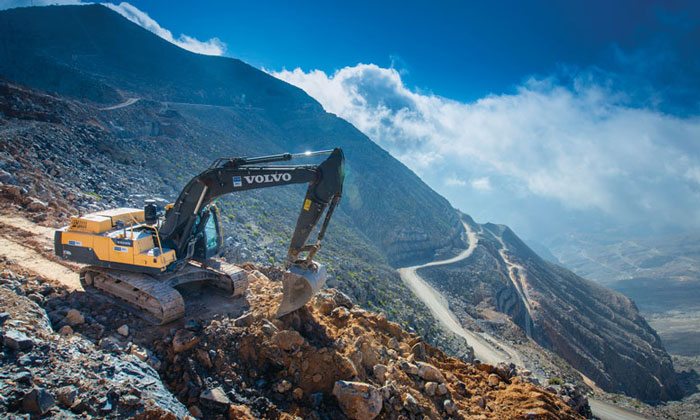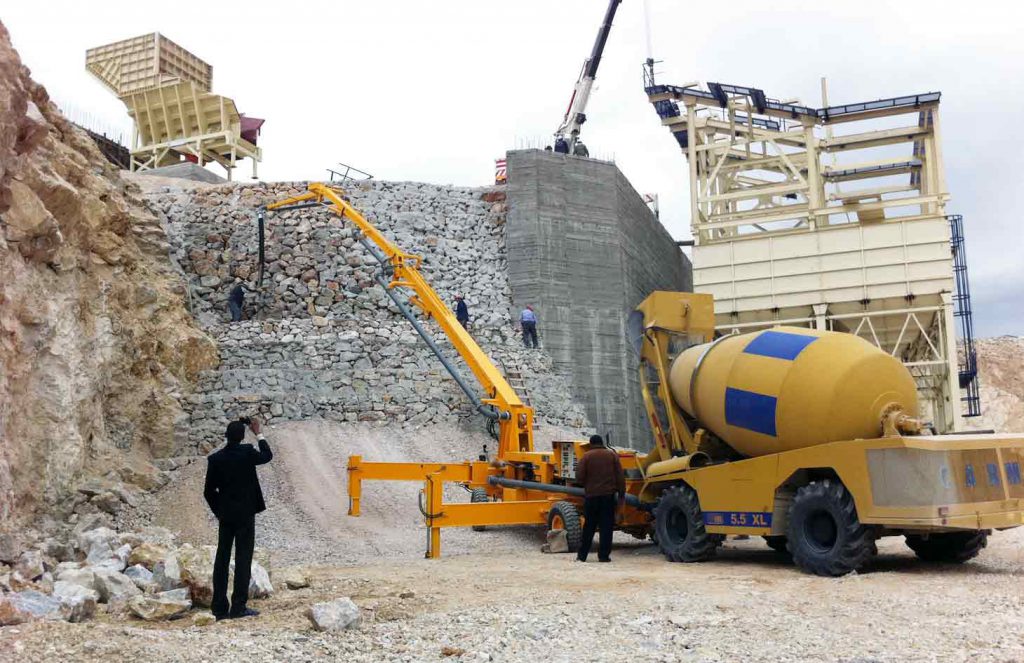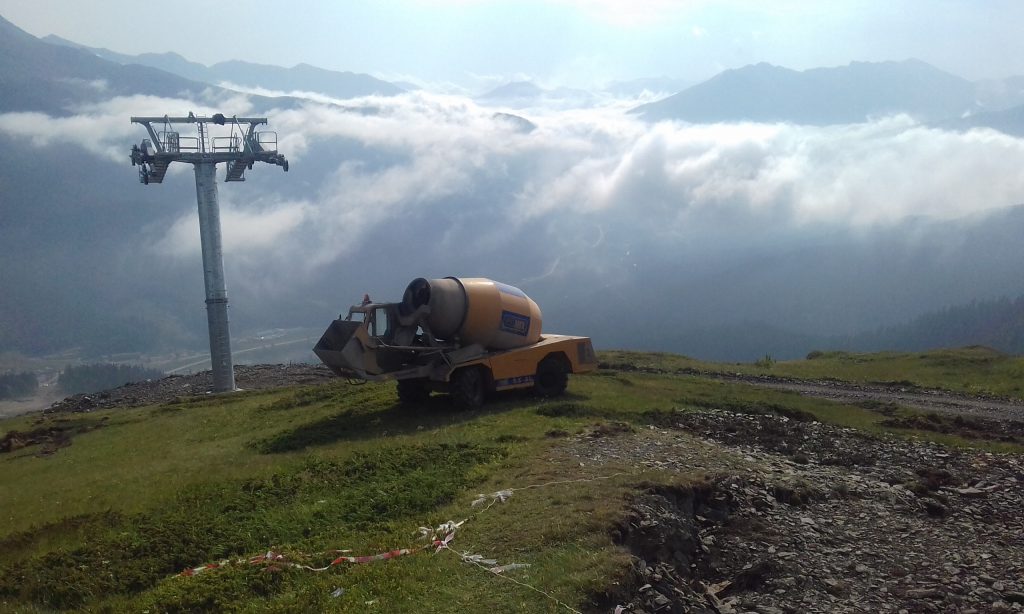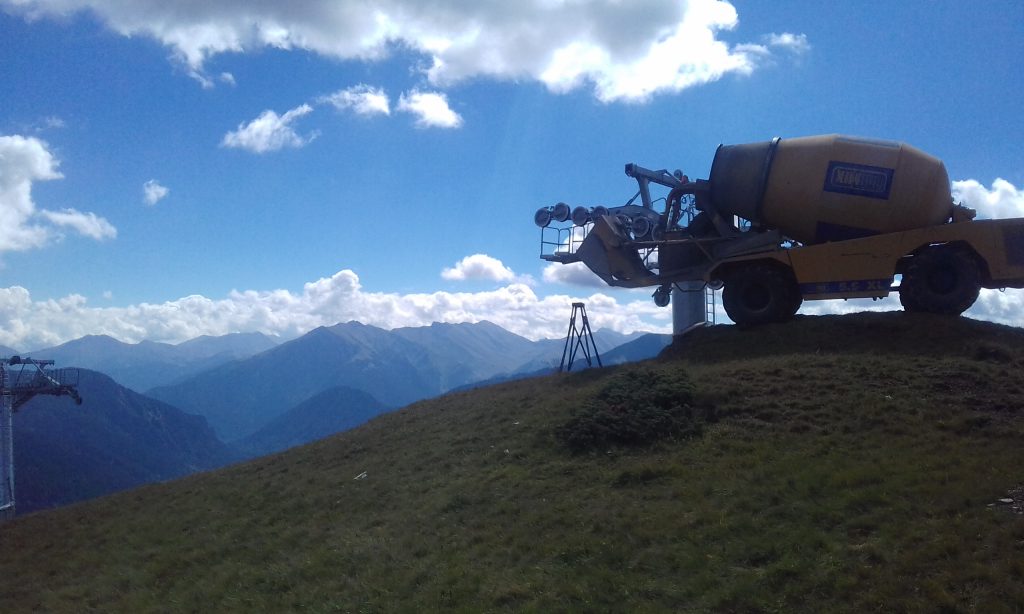Concrete for various projects in the mountainous areas
Table of Contents
- What types of construction projects are typical for mountainous areas.
- How and where concrete is used in various types of construction projects in the mountains.
- Challenges of getting fresh concrete to the construction site in time and in necessary quantities.
- Why is it a bad idea to use a stationary batching plant for a project in the mountains?
- How can a self loading mobile concrete mixer overcome difficulties of construction in the mountains?

Construction projects that are typical for mountainous areas include:
- Road construction and maintenance, including building and maintaining roads through mountainous terrain, building tunnels and bridges, and installing retaining walls to prevent landslides.
- Building and maintaining:
- ski resorts and other mountain-based recreational facilities.
- hydroelectric power plants and dams.
- communication and transmission infrastructure such as cell towers and transmission lines.
- mountain shelters and hiking trails.
- water supply systems such as pipelines and reservoirs.
- mining operations.
- residential and commercial developments in mountain communities.
Concrete is a versatile building material that can be used in various types of construction projects in the mountains. It is commonly used to build foundations, footings, and retaining walls in mountainous areas. Concrete can also be used to construct roads, bridges, and tunnels through mountainous terrain. In ski resorts, concrete is used to construct ski lifts, gondolas, and other related infrastructure. Additionally, precast concrete is often used to build buildings and structures in mountainous areas, as it can be easily transported to remote locations and assembled on site.
For example, a retaining wall is a structure built to hold back soil, rock or other materials in a vertical or near-vertical position. It is used for a variety of purposes, such as:
Supporting an embankment or slope: Retaining walls are often used to hold back soil or rock on a hillside, preventing it from sliding or eroding.
Creating level spaces: Retaining walls can be used to create level terraces in sloping yards or gardens.
Flood control: Retaining walls can be used to protect low-lying areas from flooding.
Decorative purposes: Retaining walls can also be used as a decorative feature in gardens or landscaping.
Structural support: Retaining walls can also be used as structural support for buildings or other structures.
Water management: Retaining walls can help to manage stormwater and prevent erosion.

Retaining walls can be made of various materials such as wood, stone, but concrete is a more preferred material. They can be either vertical or sloping. They can range in height from a few inches to hundreds of feet.
Even for a regular construction project it can be a great challenge to provide concrete in sufficient amounts at the right time not to delay the project and mountains pose a big challenge in terms of getting large volumes of fresh concrete in time.
Among such challenges we can point out the main ones:
- Accessibility: The mountainous terrain may make it difficult to access the construction site with heavy concrete trucks. Narrow and winding roads, steep inclines, and tight turns can make it challenging to navigate the area with large vehicles.
- Distance: The construction site may be located far away from the nearest concrete plant, making it difficult to transport fresh concrete quickly and efficiently. This can increase the cost of the project and delay construction timelines.
- Weather: The mountains can experience harsh weather conditions such as snow, rain, and high winds, which can make it difficult to transport fresh concrete. The concrete may freeze or become too wet to pour, causing delays and additional costs.
- Safety: The mountainous terrain can present safety hazards for the transport and pouring of concrete. Slips, trips, and falls can occur due to uneven or unstable terrain, making it important to take extra precautions.
- Limited space: The construction site may be limited in space, making it difficult to store and mix the concrete. This can cause delays in the pouring process and increase the risk of waste.
- Environmental concerns: In mountainous areas, the construction process could damage the environment, leading to potential legal and environmental issues. Careful planning and execution are necessary to minimize environmental impact.
One has to be very careful when considering installation of a stationary batching plant for a project at high altitudes, and here is why:
Installing a concrete batching plant in the mountains can be a bad idea for several reasons:
Accessibility: The mountainous terrain may make it difficult to transport materials and equipment to the site, which can increase costs and delay construction.

Stability: The mountainous terrain can be unstable and prone to landslides, which can put the plant and its workers at risk.
Environmental Impact: The mountainous environment is fragile and can be easily damaged by construction activities. The plant may also produce pollutants that can harm the local ecosystem.
Noise Pollution: The plant’s operations can produce a significant amount of noise, which can disturb local residents and wildlife.
Zoning Restrictions: Some municipalities have zoning laws that prohibit certain types of industrial activities in mountainous areas, making it difficult to obtain the necessary permits.
Overall, installing a concrete batching plant in the mountains can be challenging and may have negative impacts on the environment, local communities, and the plant’s operations. It’s important to carefully consider all factors before making a decision.
However there is a concrete solution available for all high altitude projects around the country!
Carmix has vast experience in production of concrete for Ski resorts, and other mountain projects all over the world. Our experts can not only give consultations on how to operate a self loading concrete mixer, but also on how to organize a construction site in the mountains in the most efficient way to get the highest concrete production output possible.

Carmix is a type of self-loading concrete mixer that is known for its ability to navigate rough terrain and steep inclines, making it well-suited for use in mountain construction projects. Its compact size and high mobility also allows it to access remote locations that would be difficult for larger concrete mixing trucks to reach. Additionally, the self-loading feature of the Carmix allows for efficient and precise mixing of concrete on site, reducing the need for additional labor and equipment.
Here are just a couple of reasons why Carmix is the right choice for such challenging conditions:
- Use of a 4-wheel drive: A self loading mobile concrete mixer with a 4-wheel drive can easily navigate the steep and uneven terrain found in mountainous regions.
- Compact size: A compact and lightweight self loading mobile concrete mixer can easily maneuver through tight spaces and narrow roads in the mountains.
- Precise electronic load cells weighting system for strict compliance with given mix design.
- Ability to use “crab walk”, and other steering modes to drive up to the exact pouring location, making it possible to avoid the need for additional equipment, such as concrete pumps etc.
- Adjustable drum speed: Having the ability to adjust the drum speed of the mixer can allow for better control and stability when working on steep slopes.
- Strong suspension system: A strong suspension system can help the mixer to maintain stability while traversing rough terrain and uneven ground.
- Self-loading feature: The self-loading feature of the mixer can reduce the need for manual labor, making it easier to transport materials to the construction site.
- High-quality tires: High-quality off road tires with good traction can help the mixer to maintain stability and maneuver through difficult terrain.

“Carmix USA” has vast experience in concrete production in the most remote and hard to reach construction projects. The best part is that Carmix procuses concrete with minimal expenses and most of the time our clients save 20% to 50% of their concrete costs by using Carmix for their project.
Contact us and let us demonstrate how Carmix can help your project become more efficient and profitable!
We have both rental and purchase options available for our clients, so you can try the equipment first without having to buy one!

